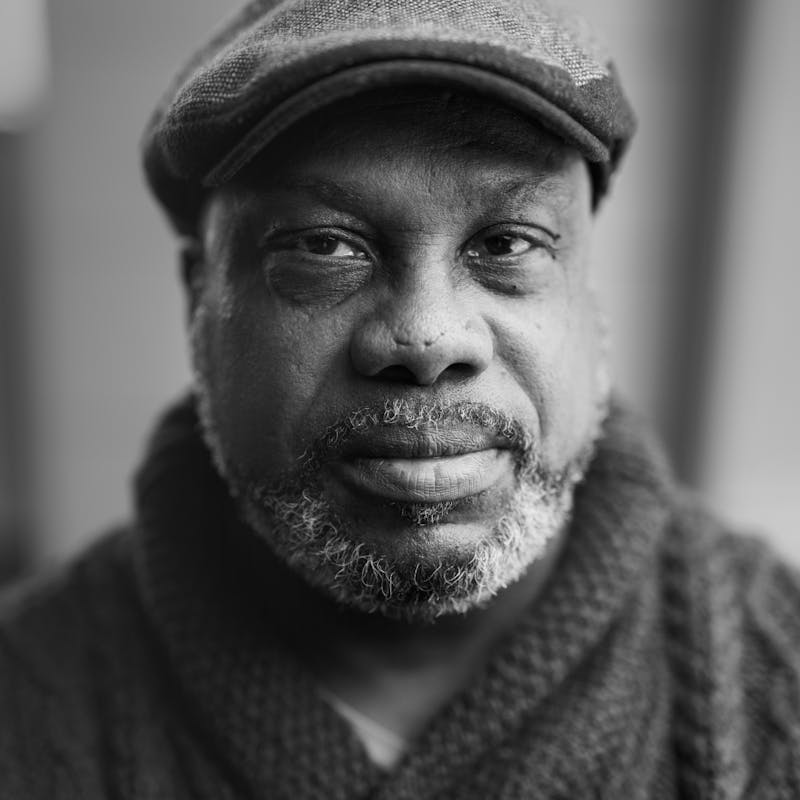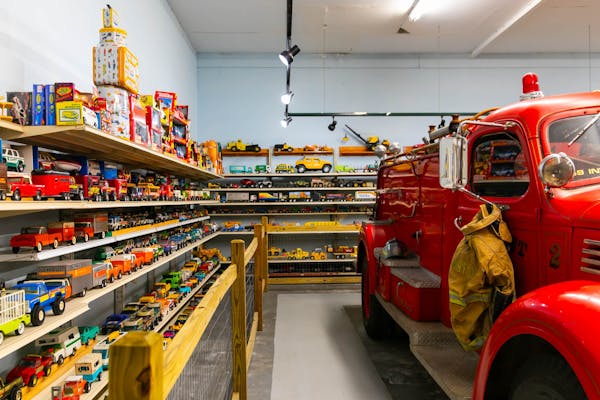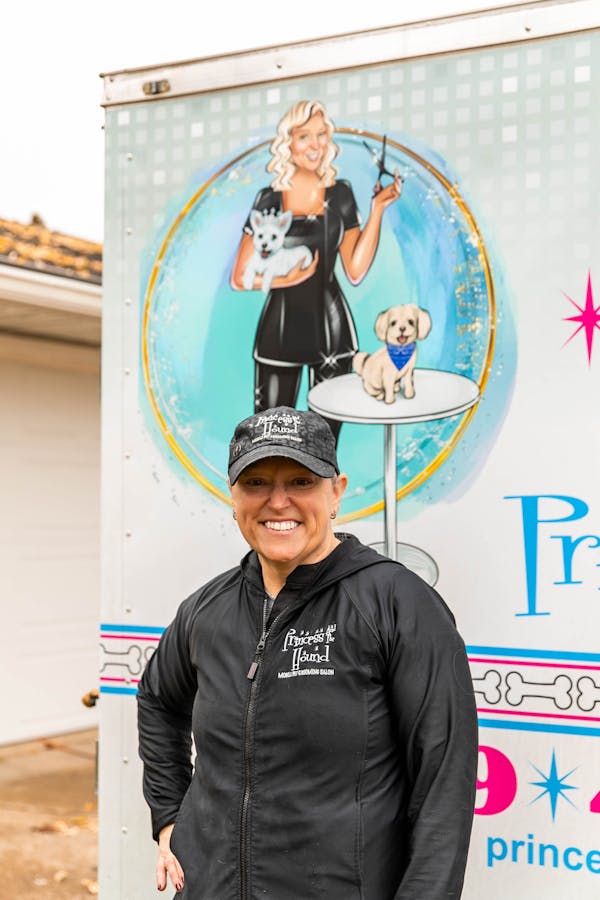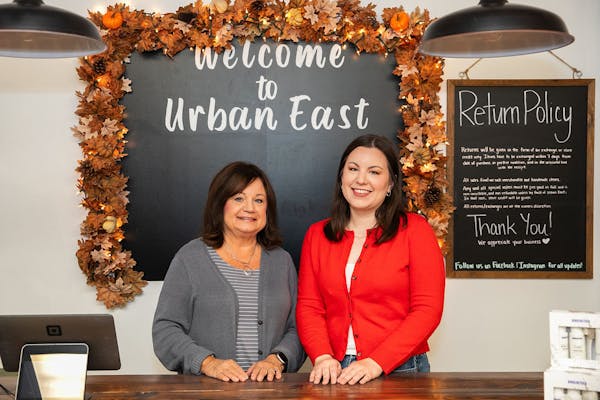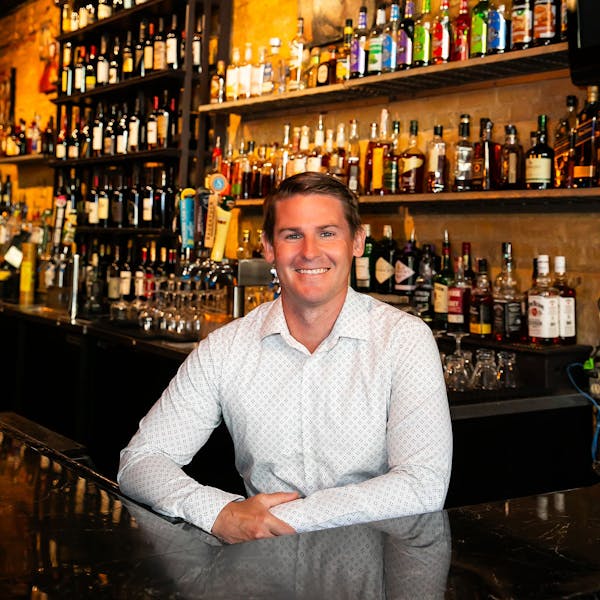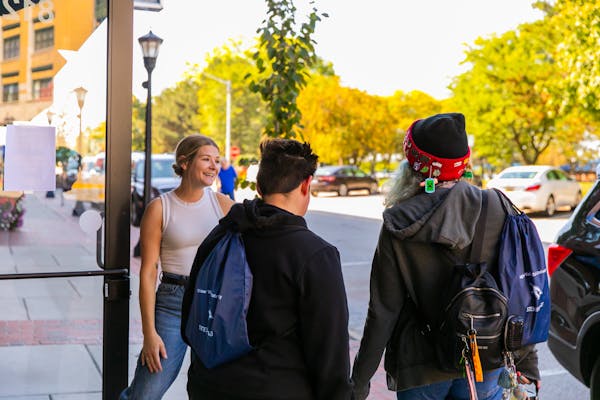“I loved my mom more than anything in the world. We were very close, and I believed everything she said to me. But growing up, she left the house relatively young, around 15, started partying, and got hooked on heroin.
Then she got pregnant with me.
The thing about my mom is that despite what she was doing, when she found out she was pregnant, she stopped everything, went back to my grandma's house, and stayed put until after I was born. Then she went back out on the streets.
She liked to hang out with her friends a lot. She took me with her everywhere she went, but when she didn't want to take me into certain environments, she would drop me off with people she knew. She would say, ‘Hey, I’ve got to make a grocery run. Can you watch my son?’ She would leave and they wouldn't see her for hours or days.
One day, when I was two years old, she left me with someone and, sure enough, she didn't come back. The person decided to take me over to my grandmother's house, sat me on the porch, jumped in their car, and left. My grandmother said that she heard the car speeding off. She lived on a dead-end street with lots of kids who’d play kickball, so it was very uncommon for a car to speed off like that, so she opened the door to see what was going on out in the street and there I was, sitting on the porch.
I officially entered the foster care system three days later after a social worker with CPS had knocked on her door looking for my mom and looking for me.
I don't remember anything about the day that the social worker came by, but I do remember Christmas night, six years later. My mom had told me that she would show up for Christmas, but she didn’t. She didn't show up like she promised, and I had a huge meltdown.
I was saying things like ‘I want to die’, throwing myself against the wall and banging my head on the floor. I didn’t know how to handle what was happening to me, and when I’d have tantrums like this, my grandmother would try to restrain me to make sure I didn't do too much damage. In the midst of my anger, I swung and hit her in the mouth and busted her lip. There was blood everywhere and she called the police. The police came while I was still throwing stuff in the house, so they walked in and restrained me, until I calmed down. Then they put me in the back of a police car and I sat there while they talked to my grandmother inside of the house.
The cop came out to the car and said, ‘If you don't calm down, I'm going to have to take you to prison.’ I didn't know he couldn’t take me to prison because I was only eight years old. Because I was scared, I calmed down and he took me back to the house.
But that night, on Christmas, my grandmother packed up my things and took me to an orphanage.
It was called St. Francis Home for Boys, a huge facility in Detroit. It was a long ride there and I sat in the backseat. I remember it being night. It was dark and my grandmother was quiet. When I got there, I heard a lot of boys yelling, some were laughing and some of them were crying. The staff was there, and because it was a Catholic facility, there were nuns walking around in their traditional outfits.
I remember not knowing where I was at. I remember being confused because I didn’t know what was happening. I remember being angry. I remember the staff grabbing me and pulling me from my grandmother as she walked away.
I had been in trouble before. I used to get into trouble a lot at school, but I had never been dropped off somewhere like this.
Later, when I was grown, my grandmother and I talked about that moment. She said how badly she felt about doing it, how sad it made her. But she said that I was too big, that she knew she couldn't handle me anymore.”
%20(Copy).JPG?ixlib=gatsbyFP&auto=compress%2Cformat&fit=max&w=1200&h=1500)
“My experience in foster care was an emotional roller coaster. In 10 years, I was in 20 different placements that I can remember. A lot of that moving around had to do with my behavior. I was a good kid, I just wanted things a certain way: and what I wanted was to be with my mom.
Whenever there's an episode, a ‘removal’ is what we call it in the system, you get removed from the home you’re in and put into a temporary placement for 30 or 60 days until DHS figures out where they're going to put you. From there, you go to another residential placement, depending on your behavior.
During this, most kids are going through the stages of grief, because they've already lost their parent or parents. Even if their parents are still alive, the kids have lost them, so they go through the stages of grief as if they had passed away. Those stages include a lot of different behaviors and emotions: there’s anger, there's depression. Those things have to be managed and monitored, so you go to a facility, and once they get you stabilized, you’re put into a foster home.
Three different placements right there.
In the foster care system, there's always the hope that a child can go back and live with their biological parents. My mother was an addict. She would get herself together and get clean for a while, then I would get placed back with her—still under foster care—until they figured out if it was going to last. It never did. My mother would relapse, I would be removed, and I’d go through all the stages of grief again.
Three more placements.
Now for me, I was a decent kid, so I would go to these residentials and do well in the program. I’d go in and be a good kid. But after your behavior is good for a while, they can't keep you there, so then they place you in a foster home, and that's where things didn't work out for me. I was in a foster home with a family, but I had no point of reference as to what a stable family was. What does love even look like? I couldn’t handle the love of the foster parents. I had a feeling that I was betraying my mom by getting close to people. I also felt that the closer I got, the more they could hurt me.
I had all of this fear I couldn’t deal with, so I started doing things, subconsciously, to self-sabotage the situation. I'd run away or throw temper tantrums to get sent back to a residential facility. My behavior would get under control, I’d go back to a different foster home, and the cycle repeated.
No child gets placed in foster care because of something they did, but what becomes our responsibility is our behavior. I had a great situation at my grandmother's house. I was living with my grandma, my aunt, my uncles. Everything was perfect—except for my behavior.
I just could not adapt to that situation without my mom. I needed her to be there. Every time she would show up, she’d make these promises that we were going to get a place together, or that she was going to come home and live with all of us. It never happened, and it just tore me up.
I didn't know anything about drugs. I didn't know what my mom was doing. I never saw her put needles in her arms. All I saw from the outside looking in is that my mom was having a great time with her friends and not with me. I'd be sitting in the back of the car for hours in the parking lot of a liquor store while she'd be running the streets, doing whatever she was doing. She was having fun, so I thought that she loved her friends more than she loved me. I thought that everything else in the world was more important than I was. I thought I was in the way of what she was trying to do. I thought I was the problem, that something was wrong with me.
Why doesn't she love me? Why doesn't she laugh like that with me? Why doesn’t she smile at me like that? Why doesn’t she want to spend as much time with me as she does with her friends? What is it about them?”
%20(Copy).JPG?ixlib=gatsbyFP&auto=compress%2Cformat&fit=max&w=1200&h=1800)
“In the foster care system, what happens when a person turns 18 depends on when they came in, but the normal route of transitioning out is a very rigorous process. At age 14, they start trying to get you ready to be out there on your own, teaching you life skills and getting your support network together. They also give you different opportunities to begin supporting yourself. For example, if you work part-time, go to school part-time, or volunteer part-time, they’ll give you $600 a month until you turn 21.
Essentially, you have two choices: either you take advantage of the opportunities that are given to you and leave the system with support, or you leave by yourself and you’re on your own. If you do that, you're going to end up going through all types of hell.
And that's what I did.
I aged out of foster care alone. I had a lot of opportunities handed to me and I just didn't want to do them. There were a lot of different reasons for that. I was smoking, drinking, and being young and wild. I didn’t want to deal with any rules. I didn't want anybody telling me what to do.
The last opportunity I had was in a supervised independent living situation. All I really had to do was not smoke or drink in the house, and not have people overnight. But I did all of those things, and when I was confronted by my supervisor, I lashed out and threatened him. He got tired of it and said, ‘Hey, I'm done. I've tried to help you.’
At that point, I had just turned 18. When a worker came over to tell me I had to leave, I thought that she was just going to take me to another placement.
But she said, ‘We don't have anywhere else for you to go. You're 18 years old, we've given you all kinds of opportunities, and you’ve blown everything. You have to leave.’
I had all these little tactics for situations like this: at first, I would cry, then I would get angry and threaten. When I started threatening her, she called the police. She said, ‘You better get walking down the road or you are going to be in jail.’ So I grabbed my bags and started walking.
I remember the first night I was homeless. When the girlfriend I had at the time heard I was getting kicked out, she told her parents, 'If you don't you don't help my boyfriend, I'm going to run away’, and that's what she did. They caught up with her and took me over to sleep in an abandoned house. I lived in that house for two days. There were other people living there on hard drugs, and that was actually my first introduction to crack. I didn't smoke it, I just saw it being done, but I remember smoking the old cigarette butts out of the ashtrays there.
Then I went to a place called Job Corps. I was only there for a few weeks, and then I ended up really homeless down in the Cass Corridor of Detroit. They used to have this program called General Assistance, where they would give you money for an apartment and food stamps. The only thing that I could afford was a motel room, and the guy managing the motel was selling his drugs out of there, and he looked at me like I was fresh meat.
He was like, ‘Hey, man, I got a job for you if you want it. All you’ve got to do is just stand in this hallway. You ain't gotta go chase nobody, they'll know exactly who you are. I want this much per pack and I'll pay you this much at the end of the night.’ So, that's what I did.
Before I started selling, I remember feeling lonely. I remember going to the corner store and buying a loaf of bread, some peanut butter and jelly, and a big container of orange juice that I brought back to the motel room. I sat in my room and didn't know what to do. I was scared. I didn't know anybody. I didn't know what to do next. I didn't even know how to get a job, so when he offered me one, I took it.
About two months in, the raid happened. There was a crew in the motel doing plaster work and drywall. They had on white suits and I'm in the hallway talking to them, waiting for people to come in and buy. The next thing I know, boom, the door gets kicked in and people start yelling at me to get down on the floor.
I remember that when handcuffed me and brought me out into the lobby, the manager of the hotel I was selling drugs for wasn't in handcuffs.
In the back of the police car, I started trying to talk them out of taking me to jail by telling them my story to get their sympathy. I told them about how I was in foster care and my grandmother didn't want me, how I went through 20 different placements and group homes, and all of that how DHS kicked me to the curb when I turned 18.
The police officer said, ‘You have the right to remain silent, and you should exercise that right. The best thing you can do to protect yourself is to keep your mouth closed.’
He didn't want to hear anything I had to say, and that's when I realized that society really doesn't care about your past. They don't care about the sympathy story you’re telling. You have to play by the rules just like everybody else, and I found out the hard way.
The raid was my first rock bottom, the first time I started thinking, ‘What is my life going to become?’
They took me to the Wayne County Jail. I remember it was nasty, dirty, and it stunk. There were people yelling. I was 19 at the time, and the reality set in that this is where men go when they do the wrong things. They don't go to foster care, they don’t go to a residential facility, they go here. It just felt like I was in Gladiator school or something, where everybody is all about themselves and keeping one eye open when they're sleeping. There were a lot of things that I didn't know anything about and that was scary for me.
I didn't talk about foster care when I was in jail. I thought about what happened in that cop car, how I tried to tell my story, but it didn't mean anything. So, when I got to the county jail, I didn't think it would mean anything to anybody else and that even worse, it could be seen as a weakness.
When I got out of jail, being on my own was about survival. It was about a loaf of Wonder Bread, some peanut butter and jelly, and some orange juice. It was finding out where the soup kitchens were, that they were giving out bag lunches at the Salvation Army today and the Methodist church tomorrow. I figured out what churches will give you what, and that if you go and tell your story, they will be more sympathetic. They might even give you a $10 bill along with a few pairs of socks, depending on how good you told your story, so I told my story to my advantage. I did a lot of that to maneuver and survive.
But I knew I wouldn’t make it unless I left the person I was with at the time. We loved each other, but we were bad for each other, and I knew I had to leave. Breaking up a family was a hard decision for me to make, so I stayed in that relationship for a long time, a lot longer than I should have, because of my son and my stepdaughter. When I finally left, I went into a major depression, deeper than I've ever experienced in my life. I was away from my kids and, even though it couldn’t work out between us, the woman that I loved.
That was my second rock bottom. When I first started thinking about suicide, I was like, ‘You can't do that, you got a son.’ But more and more, I started to think, ‘Your son will be okay after a while.’
Through all that and after looking back on my life, how I had been through so much, there was a power greater than myself with me the whole time. I started seeking God asking, ‘Why am I here? What am I here for? What are we doing?’ It was revealed to me, through Him, that my purpose was to help people who have been in foster care like myself. I needed to help them not only transition out of foster care, but to discover their path of recovery.
My purpose was to share with them what God was about to share with me.
I started going to NA and AA meetings. It wasn’t easy. Then, a couple of years into my sobriety, I started working with other addicts who were getting clean. I became a recovery coach, and that’s when I really started to understand my own story.
One time at a meeting, a woman began sharing her story. She was crying as she talked about how her kid got taken away from her and put in foster care. She said that she really loved her kid and that she didn't know how to stop using. She said the withdrawals were so painful, and while she didn't want to use, she also didn't want to feel the pain.
I'm looking at her, and I saw the face of my mother in hers. I realized what my mom was going through. It wasn't that she didn't love me, it was that drugs had taken over her life in such a way that she couldn't be the mom that she wanted to be.
%20(Copy).JPG?ixlib=gatsbyFP&auto=compress%2Cformat&fit=max&w=1200&h=800)
“When I was 16, I was in a foster home in Saginaw. Shortly after I was placed there, I met a kid in the neighborhood, we hit it off and he took me to his house. When we got to his house, his mom was sitting at the dining room table right as we walked in the door, smoking weed. It smelled like weed everywhere. She had some dime bags out she was selling from the table. We walk in there, he hugs his mom, she hands him the joint she was smoking, and they start smoking it together. She gave him a kiss and a hug and said, ‘Hey, babe, I made some tacos and they are on the stove.’
And I thought, ‘That's what I want. I want that right there. I want whatever they got between each other.’
I thought that that was going to be how it would go the next time I would see my mom.
After I turned 18 and got kicked out of foster care, the chance came up to see her. I went to the store and got someone to buy me some 40s, because she didn't smoke weed. My mom liked to drink and I liked to drink, so I thought that I would go over to my mom's house, we would sit down at the table and we would drink together and laugh.
That's that picture I saw in my head. That’s what I wanted and I thought that's what I was going to get, but it didn't turn out that way.
Going over to her house, I was a little nervous because I didn't know if she would drink with me. I had some reservations about telling her how I felt about the foster care experience, about asking her some questions about how things turned out like they did. My mom was one of those people where she says what she says and you don’t ask her no questions about it. So, I thought if we sat down and we had some beer together that it would loosen her up and we would end up talking.
When I showed up, she didn't say anything about me getting those beers, but I cracked them open. We sat down, started drinking, and we were laughing at first. But then, as the buzz started to come on, I started to get more courageous. I started asking her questions—and she didn't have any answers for me. I really expected her to give me an answer that I could live with, something I would understand, an answer that would make me say, ‘Oh, man, I get that!’
That's what I needed.
But she said, ‘It doesn't matter what answer I give you, you’re still not going to understand,’ Later on, what I realized is that the answer that she was wanting to give me was about her addiction and that she was right—I wouldn't have understood. I wouldn't have understood what it was like to withdraw from pills or opiates. I would not have understood what it meant for someone to be addicted and make bad decisions against their will. I would not have understood that my mother didn't want to do the things she did.
I wouldn’t have understood any of it.
But that night we ended up getting into an argument because I wasn't getting the answers that I thought would make me feel okay. My mom shut down and wouldn't talk about it anymore, and that's when I got angry. I started yelling at her and saying all these mean things. I called her every name in the book. I had never talked to my mom like that before, but I just unloaded, screaming at her telling her how I felt. The last thing I said to her was, ‘I hate you.’
When I left her house, I felt relief because I told her how I felt. I cut her off and cut off my whole family: my grandmother, my aunt, everybody. I made the decision that I wasn’t going to see them anymore, but that decision always haunted me, especially when I went to prison because in prison there was no getting high or drunk to forget about things. I was in a cell and truly by myself. There was no family to visit with. There were no phone calls I could make. There was nobody on the outside for me. There was nothing, and I was truly by myself in the world.
That's when I started thinking that maybe I made a mistake by cutting off the rest of my family. Not necessarily my mom because I had already come to the conclusion that I was never going to talk to my mom again, and I made myself be okay with that.
So I reached out and called my grandmother…and she wouldn’t answer the phone. She would not accept the phone call and she kept hanging up on the operator.
I kept trying for a few days and then my aunt Jackie picked up the phone. She was like a sister to me. She picked up the phone and accepted the call. She took the phone over to my grandmother and said ‘Mama, it’s Aland. Just talk to him for a minute.’
She got on the phone and we talked. She said she was upset with me, but she never said, ‘I told you so,’ or ‘I knew you were going to be in prison.’ She didn't say any of that, but she did say, ‘I know that it was you that broke into my house, because I smelled the cologne that I bought you for Christmas.’
When I was homeless, I broke into my grandmother’s house. I was in survival mode and that was my Hail Mary because I needed some money. I caught the bus for $1 and took it all the way to Inkster, broke into her house, stole a bunch of costume jewelry and whatever else I could find, and then pawned it.
I got $25.
My aunt took the phone back from my grandmother and said, ‘We've been looking for you for a year, where have you been?’ I said, ‘I've been here.’ She said, ‘We called DHS and everybody that we knew to call, and we couldn't find you. Your mom died almost a year ago and we couldn’t find you.’
She had died a year after our argument at her house.
When they told me that, I didn't feel anything because I had already made up my mind. The mind is a powerful thing, and I had made up my mind that she was dead to me and I had already done whatever mourning I needed.
After that AA meeting, listening to that woman tell her story and seeing my mom’s face in hers, and then hearing another woman say how she would cry out to God as she was shooting up and thinking about her kid, I decided to forgive my mom.
That was a really tough peer support encounter, the toughest one I've ever had. But it led me to feel compassion for my mom. I started exploring that in my recovery process, peeling back the layers of the onion and really getting down to the nitty gritty of my anger and resentment.
What it boiled down to was forgiveness. Here I was, carrying around those sacks of potatoes all my life, these people who have done me wrong. I'm carrying around those sacks of potatoes with me. That's when I started that whole forgiveness process, which was quite the journey.
Forgiveness is quite the journey, and it has to start with a decision. Forgiveness can’t wait for our feelings. I had to come to the point where I had to say, ‘Mom, I'm going to make a decision to forgive you. You’ve passed away, probably up there with God, not thinking about this at all, but I’m down here with all of this anger and resentment, and I need to let go.
In that decision for forgiveness, I was choosing to no longer carry those things. I had decided to forgive her. It took a long time for me to feel like I forgave her, but that’s why I say that forgiveness is a process just like the recovery process: there’s awareness, understanding, acceptance and forgiveness. It's not enough to do the first three things and not do that last step.
Forgiveness is also a lifelong process because there will be triggers that will remind you of how you were hurt, but you always have to remind yourself that you’ve made the decision to forgive, to let it go. Every Christmas, every Mother's Day, every holiday or season that triggers me, I have to remind myself that I let that go. I'm done with that. It is forgiven.
There is a person by the name of Bishop T.D. Jakes. He doesn’t know it, but he’s been a giant influence in my life. I like listening to his teachings and sermons where he talks about forgiveness, something he talks about is your belief system. Your belief system is created at a very young age and it turns into your ‘default settings’. When you're triggered by something later on in life, the first thing your brain wants to do is take you back to your default settings and we react the same way we’ve always reacted.
But in order to change, you have to change your belief system, and to do that, you have to go back and look at your story. As a kid, my story became about how I'm not good enough, not worthy enough as I tried to explain to myself why that was all going on. Why is my mother not keeping her promises? Why is she not coming to pick me up for home visits? Why can't she stay clean? Why doesn’t she love me?
The belief system I created to answer those questions to blame myself. I would pick apart every little thing about me that I thought were defects and say, ‘That's the reason.’ That belief continued throughout all of my relationships. If I got rejected, it was something I did. If somebody didn't like me, it’s because there was something wrong with me. It always came back to me. That impacted trusting other people, like putting trust in foster parents or staff. It was the belief that if I can't trust my own mother, then I can't trust nobody.
But forgiveness changes that by letting go. Forgiveness says, ‘I'm doing something different today’.
Bishop T.D. Jakes helped me understand what a relationship with God looks like, and who God is. God is a loving God. He's forgiving. He’s understanding. He’s faithful. He's all these things. My perception of God before those teachings was that he was this being in a cloud with a rod waiting to beat me down every time I did something wrong. Understanding that relationship was key to my recovery, because now I look at God as somebody who's not standing there waiting to accuse me every time I do something wrong, He’s waiting for me to come to Him, so I can better myself.
I want it all. I want everything that God has to offer me, especially in regards to my mental health and wellbeing. I want to prosper mentally and spiritually, so I was willing to face that head on and confront it, so I can experience that recovery freedom that I've been looking for.
I knew forgiveness was the right path, I just didn't want to take it. God has forgiven me for so many things I can't even count. I knew from my relationship with God, that if I'm going to reap the benefits and the blessings of God, if I'm going to really experience freedom in my heart, my soul and my spirit, if I'm going to really, really experience it, that I need to forgive others.”
%20(Copy).JPG?ixlib=gatsbyFP&auto=compress%2Cformat&fit=max&w=1200&h=1500)
“I went to a place called Boysville, a placement with a 60-acre campus, 12 buildings, and a pond down in Tecumseh, Michigan. When I was in the foster system, it was one of my favorite placements. The campus had been closed for a few years, but I went down wanting to get inspired for the conclusion of my book.
It was around July. I was walking around, going through the buildings, and just taking it all in. When I walked into the school building, I thought about how it would be a great place for transition-age foster youth to learn things like skilled trades and get ready to be out there on their own. But I also said to myself, ‘There's no way I could do something like that.’ I was 47 and said, ‘Lord, I'm too old.’
As I drove away from the campus, a voice in my head said, ‘Why don't you do it?’
And I said, ‘No way. No way. No way.’
The voice came again, ‘Why don't you do it? You're able. You're capable.’
I just started crying and burst out in tears because I was scared. That was my belief system again: it wasn't that I couldn't do it, I just didn't think I was good enough to do it.
I cried and cried. I got home and I thought about it and I prayed about it. I asked God to pass it from me and to give it to somebody else who was more qualified, more educated, and more experienced. But after a few weeks, I just gave into it and that's when I started working on River Jordan.
In the Bible, the River Jordan is a place of transition. The Israelites were going from exile to the promised land, and the place in between that is River Jordan. That's where a lot of work takes place, the work and the changes that happen to prepare you for that promised land.
River Jordan is a three-fold program for youth that helps prepare them for life outside of the foster care system. We have a peer support program, a mentor service, and life skill coaching. The life skill coaching comes from a partnership with Saginaw Valley State University. They provide social work interns who use a curriculum that teaches seven life skill domains.
Then we have our transitional housing program for young people between the ages of 18 and 21 who have aged out of foster care.
With our lifelong continuum support, you can be 40 years old and come walking through our doors and say, ‘I used to be in foster care and I need help,’ or ‘I need to learn this awareness, understanding, acceptance and forgiveness pathway of recovery.’ We see ourselves as the forever family of those that have experienced foster care.
We opened in 2019, and so far, we’ve helped hundreds of people through seminars that we do for the State of Michigan. We also have four training sessions we do specifically for current and former foster youth.
One of the most challenging things that current and former foster youth face is learning how to deal with people and relationships, so that is one thing we talk about. Sometimes we get too close to people that we shouldn't be getting too close to, and sometimes we don't get close enough to the people that we should be getting close to, so we talk about comrades, constituents, and confidants and the difference between the three. Most people come into our lives temporarily, while we also have a small circle of lifelong friends. It’s a way to help current and former foster youth understand what relationships are, how to define those relationships, and then how to handle those that come and those that go in their lives.
Then we have another training called Intro to Foster Care Recovery, which is awareness, understanding, acceptance and forgiveness. We’ve done hundreds of those and the training is available to anybody.
River Jordan has given me purpose. I believe that before I was even born, God chose me to do this. He's taken the things that should have killed me and turned them around for the good of the community, to help youth going through what I went through. I'm honored by it and I still can't believe God chose me to do this. I am so grateful for it.”
%20(Copy).JPG?ixlib=gatsbyFP&auto=compress%2Cformat&fit=max&w=1200&h=1500)
“River Jordan has given me purpose. I believe that before I was even born, God chose me to do this. He's taken the things that should have killed me and turned them around for the good of the community, to help youth going through what I went through. I'm honored by it and I still can't believe God chose me to do this. I am so grateful for it.
One of the important things that I talk about is confronting your story. Confronting your story is like if there was a chair blocking your path: to keep walking straight, you have to go up to it, confront it, grab it, and pull it to the side. But you can't conquer that chair unless you confront that chair.
In the same way, you have to be completely honest when you confront your story. When I first got into recovery when I was 43, there was still anger and resentment. I had to confront all the elements. I had to bring myself to the table and say, ‘What do I need to clean up? Yes, I had all of these negative experiences, but what was my part in that?’ In my relationships, I had trust issues. I had to deal with that to move forward. I'm engaged now, but before I got engaged, I had to work on trust so I didn't bring those issues to my new marriage.
If you don’t address the things you’re responsible for, you’ll keep running into the same issues. Changing your story begins when you confront the parts of your story that you haven’t been willing to.
In the back of that cop car, my story about being in foster care, how my mom hated me, how my grandmother didn’t want me, it didn’t work. The ways I was sidestepping accountability did not work anymore.
Accepting the truth of my story means accepting all the events that happened. I was in foster care. My mom was an addict, and she died young. I went through 20 different placements. This is my truth. It’s just accepting it and not beating yourself down because of it. Just accept it for what it is, because it's the past and you can't do anything about it anyway. You just gotta accept it and move on.
Now, living a new normal for me is living contrary to what my belief system was. Everything that is contrary to it. I am good enough. I'm smart enough. I am handsome enough. I am worthy. I'm capable. This is my story. It's okay to be my story. I can share my story. I don't have to worry about your judgment. I'm here to help you. Another truth of my story is it's okay to be vulnerable. It's okay to feel. It's okay to trust. That's what I talk about when I talk about my new normal. That's my new normal. I don't know what other people's new normal is. But that's my new normal. That's what I try to do every single day.
I want to thank the community for their continued support of River Jordan since we've been open. We are community-funded. We've been awarded some small grants, but it's really the community coming together and supporting us, especially financially, that helps us keep going. Operations grants are very, very hard to come by. They're not really out there much. So, we depend on the community for those things like showing up at spaghetti dinners, MiTable events and fundraisers. Those are all very helpful to us. I just want to thank the whole community for that.”
– Aland Stamps, Chairman and CEO, River Jordan Inc
%20(Copy).JPG?ixlib=gatsbyFP&auto=compress%2Cformat&fit=max&w=1200&h=800)
